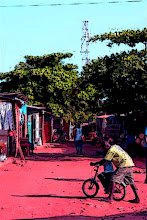I walk off the bus shaking. The drive from Ninoy Aquino International Airport (MNL)to the hotel has taken longer than usual because of traffic, and in that time, I was engaged in a discussion with the Captain, which has left me enraged.
‘I run a law firm.’
‘Oh really? Cool. Where did you study law?’
‘I’ve never studied law but I know that lawyers don’t make the best businessmen.’
Strike one.
‘Social interpretation of intelligence equates to greatness in mathematics. If you asked 100 people who was more intelligent – a mathematician, a lawyer, a fashion designer or a musician, the majority would say the mathematician.’
‘Ok, if you didn’t study law, then what did you study?’
‘Mathematics.’
Strike two.
‘But that’s very black and white, Captain. Social interpretation is exactly that, a society’s interpretation, which varies from society to society. The world is full of black, white and grey. Embrace the grey, Captain. Embrace the grey.’
‘Don’t talk to me about grey. I write. I have been published. I write and recite poetry, I know all about the grey.’
Yeah, so? Hitler was also published.
Strike three.
The Captain is a local from The Desert, a deserati. I hate to stereotype, but as Ryan Bingham says in Up In The Air (2010), it’s quicker. The captain’s archaic and misled views are a stark reminder of how The Desert has catapulted itself into modernity and is struggling to find its own set of values. The Desert in the past 30 years has transformed itself from a nomadic desert people of fishermen, farmers and mountain people, to a glittering Babylon of hotels and resorts, man-made world firsts, and malls the size of small cities.
Caught at the halfway point of the West and East, The Desert’s vantage point should have been an insightful one. However, it is as if they looked around the world for references of what it is to be a successful nation, and all they saw were the most obvious and shiniest examples in a commercialised world – a degree in mathematics, business, mega structures, luxury, and decided to make these values their own.
The Desert failed to take notice of the more understated examples of success such as recycling and public transport. Free speech (the reason why this blog is written anonymously). Human rights.
I live in a high-rise apartment building on a construction site in The Desert. For 2 years, my neighbours in the building opposite have been 200 Bangladeshi and Indian construction workers, who work 12 hour shifts in 50 degree weather with 100% humidity in the summers. I see them crawl under any source of shade they can find for a quick sleep during lunch. I see their meagre lunch of beans and rice, eaten with their hands, and I feel my heart break as they hold out their food for me, offering me lunch as they notice me staring. I see them get trucked out in dilapidated buses back to the compounds further out in the Desert, out of sight from the tourists, where they sleep 13 men to a room. The Desert is modern-day Ancient Egypt, and these men are its modern-day slaves.
My neighbours are no longer there. The building opposite my apartment is now finished, its facade brightly lit and dazzling. My neighbours are off to another building project as they continue to write the legacy of The Desert, of which they will never get a mention.
So if you ever pass through The Desert, or see its twinkling lights from afar, know that despite its self-promotion and shininess, all that glitters is not gold.
TheSartorialist.com RSS Feed
14 years ago





Deep and dark but worth the read.
ReplyDeleteOMG ~ I'm gettting hooked !
ReplyDeleteI love it!!
ReplyDelete